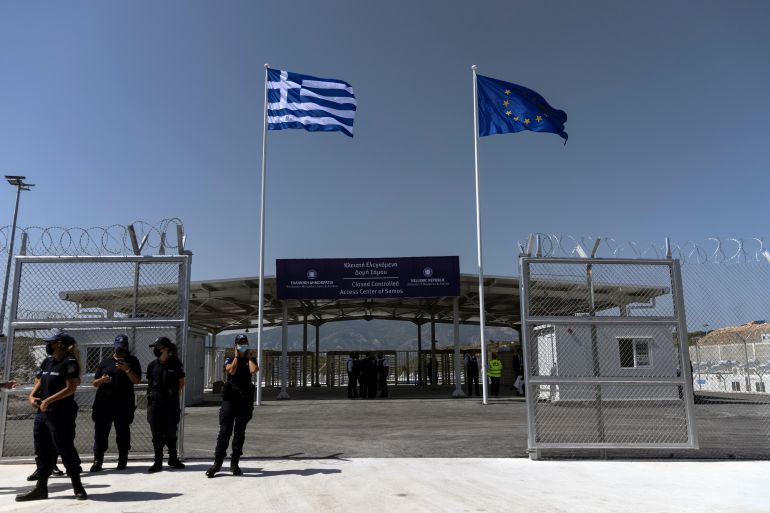Samos: Where Europe lost its values and moral responsibility
A new prison-like camp on the Greek island of Samos marks a dangerous turn of European migration policy.

As you read this, refugees and migrants on the Greek island of Samos are being transferred against their will from a makeshift camp to a new, prison-like centre. The new so-called “closed controlled access” camp is intended to house up to 3,000 people and includes an in-house detention facility for 900. The isolated facility, located far from any town, is surrounded by three rows of fencing topped with military-grade barbed wire and is equipped with a sophisticated surveillance system.
The Greek and European authorities present this new camp as a humanitarian success story. It is the opposite: a state-imposed segregation of people who are being denied their right to seek asylum, medical care and human dignity. These are families and individuals whose only purported “crime” is seeking protection, safety, refugee status and a better life in Europe.
Keep reading
list of 4 itemsHow Gaza’s children are preparing for Israel’s invasion of Rafah I Close Up
UK police arrest three over deaths of five people in English Channel
UK passes bill to deport asylum seekers to Rwanda: What’s next?
Repressive migration policies in Europe criminalise, humiliate, and punish refugees and people on the move, rather than uphold their rights under international law. To mask the cruelty of these policies, a whole new lexicon of sanitised language has been coined to describe illegal, restrictive, and inhumane conditions aimed at deterring would-be asylum claimants and refugees.
Since 2020, millions of euros have been granted by the European Commission to the Greek government for the construction of new restrictive centres, and the one on Samos is the first to open. Marketed as an improvement in living conditions, all these camps follow the same pattern: remote locations, aggressive security measures and services provided in-house, segregating people from wider society and rendering the refugee issue invisible. There is little respect for the fundamental rights of refugees and migrants, which the European Union and Greece have the obligation to comply with under international refugee and human rights law.
In recent years, Doctors Without Borders (Medecins Sans Frontieres, or MSF) has accompanied and cared for the largely Afghan, Syrian and sub-Saharan African asylum-seeking population trapped across the Greek archipelago. Over that time, we have witnessed the catastrophic impact of European deterrence and containment policies on the health of refugees and migrants, and on the communities hosting them.
And we are outraged. Since April 2021, more than half of our new patients on Samos have had thoughts of suicide or death, and nearly two out of 10 were at risk of suicide. For months now, we have seen the people we treat have the fear of being locked up in the new camp, feeling abandoned and helpless.
A report we published in June 2021 warned about the consequences of the new camp and demonstrated the severity of the suffering already inflicted on asylum seekers and refugees trapped on the Greek islands.
Placing vulnerable people on the move, some with serious mental health issues, into an isolated, prison-like environment is dangerous, and re-traumatising. “Fortress Europe” does not work. It does not deter people from seeking safety and protection and it creates tremendous human suffering and distress, fuelling fear and violence.
On the front lines of conflict, including in Yemen, Syria, Iraq, Ethiopia and Afghanistan, MSF runs hospitals and humanitarian activities, which deliver lifesaving care and a modicum of dignity. Our teams witness the often desperate journey our patients take to escape the violence of war and seek safety and the basics of life for their families.
Many of the people we assist are hosted by neighbouring countries like Bangladesh, Pakistan and Sudan. “Fortress Europe” in fact hosts few refugee arrivals compared with the size of its population. It is doing far less than its fair share to help refugees, to say nothing of the abdication of its moral responsibility. It has failed to establish a dignified and functioning refugee hosting and reception capacity.
In 2015, Germany reaffirmed the unquestionable right to seek refuge in Europe by welcoming a million Syrian refugees, emphasising the opportunity they represent for an ageing country’s future. The EU can embrace these ideas again. Given the significant number of people from Syria, Afghanistan and sub-Saharan Africa stuck in inhospitable limbo in places around the world, Europeans can take the courageous step to build a migration policy that reflects its legal duty towards people at risk, that integrates them into European society, and grants them just and timely access to asylum, healthcare and other basic services.
Instead of spending millions of euros on militarised border security and prison-like camps, and processing facilities across the Greek Islands, Italy and North Africa, the EU could invest its efforts and funds into dignified reception and integration. Europeans could leverage their global leadership role in migration, meet their obligations under international law, and reap the benefits of a more youthful, multicultural, and healthy population, crafting the EU mosaic of tomorrow.
European governments must recognise that the quick fix to the migration issue that follows the logic “out of sight, out of mind” will not work. An effective, working solution requires vision, courageous leadership, and collective responsibility. We need those today more than ever.
The views expressed in this article are the author’s own and do not necessarily reflect Al Jazeera’s editorial stance.